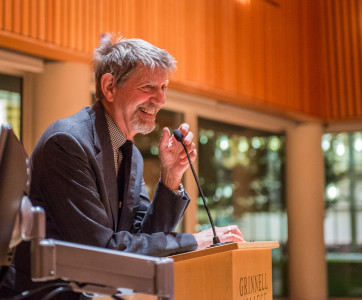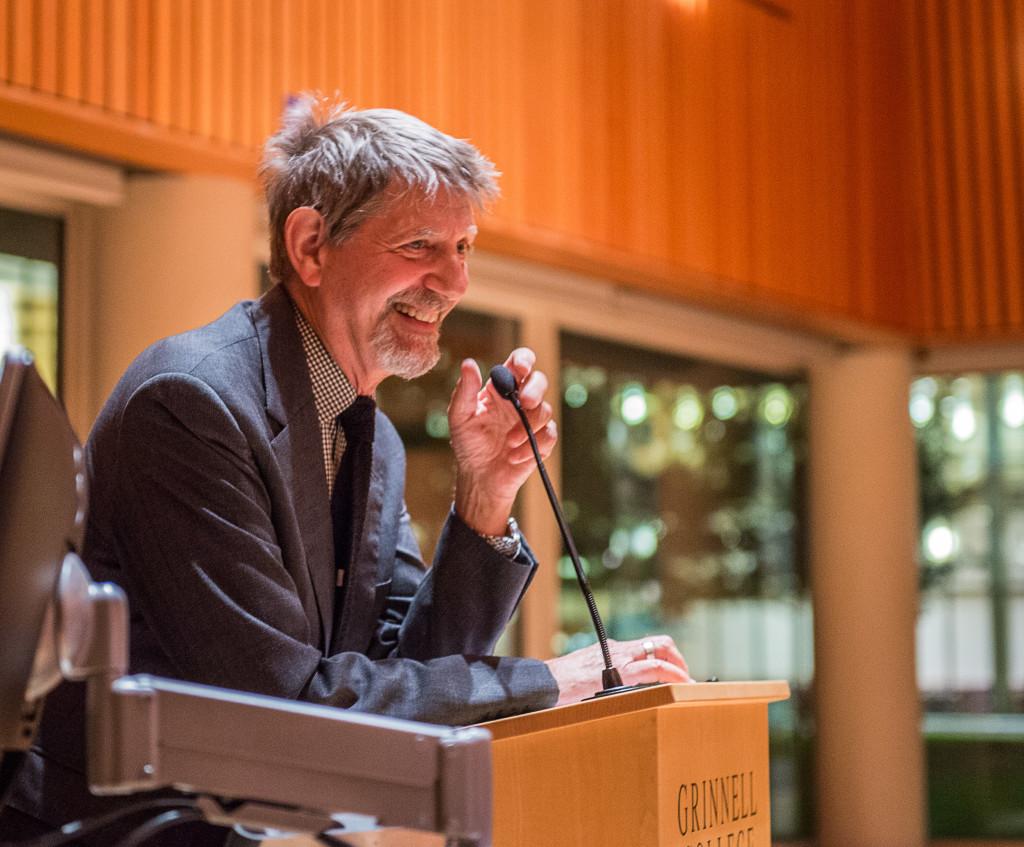
Peter Coyote ’64 has devoted decades of his life to studying Zen Buddhism, becoming a Zen priest in 2011. He is also an esteemed actor and narrator, most well-known for his work in the documentaries of Ken Burns. Coyote came to the College last week to give a talk on the power of intention. The S&B’s Copy Editor Jack O’Malley sat down to talk to him about his time at Grinnell and his philosophy of life.
The S&B: What is your favorite memory from your time at Grinnell?
Coyote: There are many. My closest friends, sitting in the student union every night, smoking cigarettes and talking about poetry from Donald Allen’s book, “The New American Poetry, 1945-1960.” Also the nurturing of a community of people that were just like me, meaning we read the same books, we thought the same things were important, and we had the good luck to meet from all over the country right here. They are still my closest friends to this day—that is, the ones that are still living.
Were there any specific events that pushed you towards Buddhism? Had you dabbled in other religions beforehand?
Well, I had been raised as a secular Jew in a family with a lot of socialists, communists and capitalists. There was a lot of high-level, high IQ chatter. Then there were events in the 60s where people I loved very much died in a way that I felt, had I been smarter and more observant, I could have taken more responsibility and maybe prevented that. This was communal living — … kids looked up to me that I wasn’t really aware of and [I] didn’t monitor my behaviour and didn’t protect them from my own charisma. Three kids in particular never made it to 23. That was something that stayed with me long after the 60s. I had been a drug addict in the 60s and when I was cleaning up my life and putting it together I had been interested in Zen and had been reading about it. I actually was dating a woman who was living at a monastery. I started to practice and it became a part of my process of healing from addiction and guilt and all sorts of stuff.
What was your favorite film or TV show to act or narrate for?
It’s hard to pick a favorite. You know, sometimes you do a movie like “Timerider,” which is a silly little cult science fiction western. I got to play this dumb cowboy and be funny. I loved doing that; it was not really that important. A movie like “A Man in Love” put me on the cover of every magazine in Europe … It was a really complicated movie about a charismatic, selfish American movie star and I still get stopped by people on the streets who say, “You nailed that guy.” Also, I love working for Ken Burns: I feel like I graduated and went to heaven. I love doing documentaries because each one is something that somebody cared about passionately and struggled for. It’s like a crash course in a single subject. I don’t have a favorite. I like the genre and the process of actually doing it.
If you could tell your college self just one insight that you’ve learned since graduation what would it be?
Don’t shoot heroin. That would be one. The other is that life is longer than you think. Take care of yourself and pace yourself. Everything’s not gonna happen all at once.
In today’s fast-paced, egocentric world, do you think that it is ever really possible to break out of your ego?
I absolutely do think it’s possible to not destroy the ego, which we need and helps keep us healthy, but to put it on a long leash and let it go when it’s not appropriate. It’s not appropriate to be thinking of yourself when you’re making love, when you’re in a fight for your life or if you’re trying to help other people, then your self gets in the way. Ego is a tool, but we elevate it to the stature of a guardian and all of the sudden it’s mediating all of our experiences. There is a whole world out there that has nothing to do with us. Hummingbirds and leopards and spiral nebulae and the Amazon. It’s just like the captain is in the wheelhouse and has put up all these photographs of his personal history, his friends, his neighbors and his qualities. He is living in this tiny room and around him is the immensity of the ocean. There are spiritual practices that help you get out of the wheelhouse and the one I practice is meditation Buddhism. Every religious tradition has a wisdom tradition, and yes, it is something that you can do, it’s something you can accomplish, something you can experience in this life and then you won’t have certain kinds of questions plaguing you anymore.






























































Scott ffolliott • Oct 21, 2015 at 10:35 pm
Everything must be doubted.